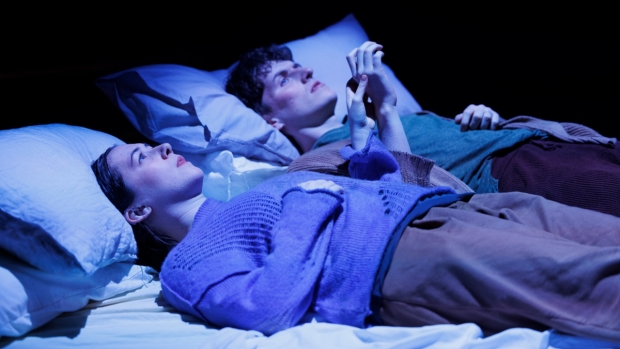”The Solid Life of Sugar Water” at Orange Tree Theatre – review

© Ellie Kurttz
There has been impassioned debate on theatre social media recently around the thorny subject of trigger warnings. JMK Award-winning director Indiana Lown-Collins’s shatteringly powerful revival of this 2015 two-hander probably justifies the employment of these content alerts more than almost anything else I’ve seen in recent years. Jack Thorne’s script deals, unsparingly, with stillbirth and the resultant grief and physical and emotional traumas that accompany it. Visceral and hard-hitting, but also humane and humorous, The Solid Life of Sugar Water may well provide catharsis for many, although there is precious little comfort in it.
Lown-Collins takes Thorne’s words, so forensically brutal and precise that they may as well have been written with a scalpel rather than a pen, and dresses them up in an elegantly stark staging that runs in striking but appropriate contrast to the messiness of the emotions and feelings of the young couple at the core. The intimacy of the in-the-round configuration is further embellished and enhanced by the use throughout of creative captions (one of the characters, Alice, is Deaf as is Katie Erich, the actor playing her), which mostly function as subtitles beamed up on the front of the Orange Tree’s circle but which sometimes explode in a sensory-challenging jumble of verbiage. It’s inclusive, consistently compelling, and hammers home the power and truth contained in Thorne’s intense, occasionally very funny, text.
The piece was first presented by Graeae, the company that champions Deaf and disabled actors and creatives, and while the disabilities of the beautifully drawn characters here undoubtedly inform them, they aren’t the sole point of the play. Before it becomes a harrowing examination of the process and aftermath of losing a baby, it’s a quirky, modern, sort-of love story, albeit an eye-wateringly sexually explicit one. A major accomplishment of Thorne’s writing is how he has created a couple who are thoroughly engaging theatrical company but who, between them, have some unattractive, all too credible, characteristics that round them out without actively turning the audience off them. Alice is spiky and judgemental, while Phil’s lovable, eccentric exterior masks an unappealing tendency to make laddish assumptions about women and their bodies: he confides to us at one point that he considers Alice to be a 7 (out of 10). Despite all this, it becomes impossible not to care.
Actors Katie Erich and Adam Fenton are as likeable as they are unapologetic for their characters’ failings, presenting them with an unflinching clarity as well as startling emotional acuity. The script requires them to jump between time periods – and, consequently, various heightened emotional states – with whiplash speed, and both performers acquit themselves with devastating accuracy. The way the facial tics and bodily spasms of Fenton’s Phil become more extreme at moments of high anxiety, or how Erich, as Alice, abandons verbal speech in favour of sign language when recounting a particularly painful memory…it all haunts and hurts. Much of the story is told as direct address to the audience, and the actors have tremendous chemistry with each other, and with us.
The controlled brilliance of direction and acting is nowhere better demonstrated than in an astonishing sequence that juxtaposes an intense orgasm for Phil with Alice’s howling, enraged agony as she is forced to give birth to their lifeless child. It’s staged as a brutal, revolving tug-of-war with a bedsheet that splits in two at the key moment (Ica Niemz’s design is dominated by a double bed atop a neon-lined abyss sinking deep into the stage floor). It succeeds in being simultaneously distressing, horribly absurd, and entirely riveting.
This is strong meat yet supremely delicate when it needs to be, and a vital, remarkable piece of theatre. It’s short, sharp, shocking, and infused with a troubled humanity that lingers long in the heart and mind.












